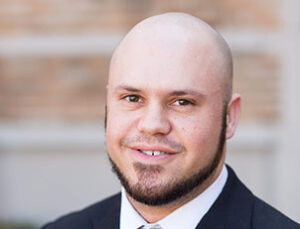 Hentig joined the U.S. Army in 2008 as an airborne combat medic. His role required supervision of junior medics and ensuring the well-being of 120 personnel. He served in Europe before being deployed to Afghanistan. His experience there has greatly informed his research interests. Suffering a severe blow to the head, which caused a TBI, Hentig spent a year rehabbing before retiring from the Army in 2012. The trauma of the injury and the long road to recovery offered Hentig a new path. After leaving the Army, he earned a bachelor’s degree in neuroscience at Western Michigan University in 2016. His Honors Undergraduate Thesis, “Chemical Ablation with Zinc Sulfate Results in Differential Effects on Olfactory Sensory Neuron Subtypes in the Adult Zebrafish” received the 2016 Best Honors Thesis Award and serves as the basis for his doctoral research.
Hentig joined the U.S. Army in 2008 as an airborne combat medic. His role required supervision of junior medics and ensuring the well-being of 120 personnel. He served in Europe before being deployed to Afghanistan. His experience there has greatly informed his research interests. Suffering a severe blow to the head, which caused a TBI, Hentig spent a year rehabbing before retiring from the Army in 2012. The trauma of the injury and the long road to recovery offered Hentig a new path. After leaving the Army, he earned a bachelor’s degree in neuroscience at Western Michigan University in 2016. His Honors Undergraduate Thesis, “Chemical Ablation with Zinc Sulfate Results in Differential Effects on Olfactory Sensory Neuron Subtypes in the Adult Zebrafish” received the 2016 Best Honors Thesis Award and serves as the basis for his doctoral research.
Using zebrafish, which have remarkable regenerative capabilities, Hentig hopes to develop a traumatic brain injury model and see how and if the brain of a zebrafish regenerates following blunt force trauma. “I love neuroscience because the brain is the center of individual existence,” Hentig said. “Furthering our knowledge and working towards regenerative therapies for individuals suffering from neurodegenerative diseases provides hope for not only the individual, but also for the families watching their loved ones slip in and out day by day.”
In addition to his doctoral work, Hentig serves as a STEM Mentor for the Warrior-Scholar Project, where he helps veterans transitioning from military service to civilian/student life. To learn more about James’s work, visit the University of Notre Dame website. To see the UND military spotlight on Hentig, visit their YouTube page.
Image Credit: University of Notre Dame
